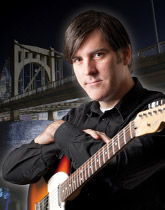
One evening a couple of summers ago, I was at home preparing lecture notes for the upcoming semester’s music classes I teach. During the previous few weeks, I had been attending shows of all kinds around town, meeting local musicians, and making new friends in the process. The vibrancy of Pittsburgh’s music scene amazes me. Whether it’s in a concert hall, a dive bar, a café, a warehouse, or someone’s living room, live music is happening all around us nearly every night. I discovered many musicians love it here, in part because of the low cost of living, ample access to performance spaces, and an artistically-informed population.
As I worked on my notes that night, I got a text from a friend telling me to come to a house I had never been to in the Pittsburgh neighborhood of Garfield. What’s up? I responded. She texted that a band I had never heard of would be playing a house show. Just be there, she insisted. You won’t regret it. So I went and joined 50 or so people jammed into a dark basement. The band members were about three feet away from me when they started their set. It was loud, and it was hot. Some in the crowd knew the songs but most didn’t. People began jumping in time with the music. It seemed everyone—audience and band—melded into a single organism. After the show, my friend said to me, “I knew you’d love these guys!” She was right. The night reinforced why I’ve dedicated my life to music.
Sharing and recommending music is a vital part of the human-musical experience. Often, we learn about bands, composers, albums, or songs from a friend who has an intimate knowledge of who we are and what we like.
Today, portable and computerized audio technologies offer some radical alternatives to how we find and listen to music. Services like GoogleMusic, Pandora, Last.fm, Amazon, and iTunes use algorithms to make recommendations in order to personalize our experience. What are the implications of these new kinds of relationships? We have gone from the labor intensive, analog, and at times intensely emotional experience of making a “mix-tape” to having an algorithm instantly create a playlist. Machines and equations are doing what friends, DJs, and record-store owners once did: recommending music for us to purchase, listen to, and enjoy.
As much as social media interfaces and recommendation algorithms have value because of their convenience, they also raise ethical, socio-political, and philosophical questions. In order to “recommend” songs for purchase, companies collect, store, and sell our personal information. What does that do to the value of human intelligence as well as the traditional roles criticism and critique play in human judgment? Is it the case that our collective sense of taste has been reduced to the Manichean choices of like or dislike; thumbs up or thumbs down?
Music has incredible power to move us emotionally, create social bonds, tell our stories, and inspire us to act. As technology changes the ways we interact with music, we need to be sure it’s not cutting us off from one of the most important parts of the musical experience: each other.
—Richard Randall
Richard Randall is Assistant Professor of Music Theory at Carnegie Mellon and Director of the CMU Music Cognition Lab. He is on the faculty of the Center for the Neural Basis of Cognition and Fellow at the STUDIO for Creative Inquiry. Along with Professor Richard Purcell (English), he is co-director of the Listening Spaces project, which seeks to understand the overwhelming impact technology has had on our social, political, and personal interactions with music.



